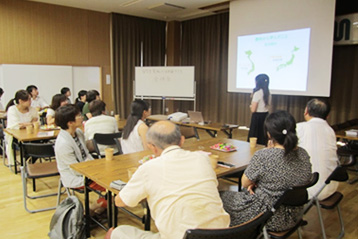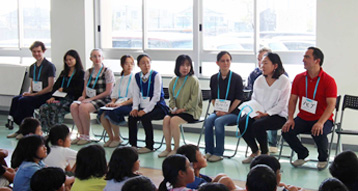- Student Life
-
- Academic & Class Calendars
- Syllabus/Timetable
- Scholarships, Student Support
- Information for International Students
- Doctoral Thesis Submission Process
- Application Forms, Notifications, Procedures
- Intensive Courses
- Learning Support for Students with Disabilities
- Methods of Integrated Interdisciplinary Research
- Counseling for International students
- Support Staff
- Interim Presentation
About ISGS
Courses of ISGS
Courses of ISGS
The study fields in the KEYWORD spectrum are organized into 6 courses
Language, Media and Communication Course
Language, Media and Communication Course
The aim of the Languages, Media and Communications Course is to promote research concerning Japanese and foreign languages, literature, and media. Based on recent developments in language studies and other relevant disciplines, this course seeks comprehensive understanding of issues associated with language use and communication.
Moving toward understanding the diverse potential of communication, ranging from linguistics and literature to manga and anime.
As media becomes highly diversified, communication, involving the processes and effects of social interaction, has become an important area of research in recent years. This course is designed for students who are seeking high-level and focused understanding of communication, including not only face-to-face everyday interpersonal communication through language, but also multimodal interaction through various media, ranging from literary genres (e.g., poems, prose, and novels) to popular culture genres (e.g., films, manga, anime, and dramas).
The Language, Media, and Communications Course consists of two fields: (1) language-focused and (2) literature-focused.
The aim of the language-focused, or the Language Communication and Language Education field, is to foster a multidisciplinary approach in equipping students with a critical look on language-related research. Based on the vast experience and knowledge gained in the course, students can conduct qualitative/quantitative and mixed-method research (e.g., questionnaires, interviews, and classroom observation), as well as theoretical and applied linguistic analysis (e.g., discourse analysis and contrastive analysis in languages).
The aim of the literature-focused, or the Literature and Culture field, is to understand the nature of literatures through the analysis of various literary works from different countries (e.g., Japan, China, South Korea, and Europe), different centuries, and different genres. The collection and analysis also covers various texts from historical archives and contemporary databases of diverse genres of texts.
Languages, Media, and Communications Course: What can students learn?
We work toward developing communication skills and realizing a mutual understanding of humans in global society through “practical training.”
Besides the “common subjects” that comprehensively cover various issues of global society, there are the “integrated seminars” that are team-taught by faculty members from various fields and the “specialized seminars” that are taught by faculty in their areas of expertise. The aim of the integrated seminars is to help students understand the nature of human communication through diverse media(movies, photos, manga, and anime, etc.). The specialized seminars aim to build a firm foundation for students to conduct research in their fields of specialty by providing a solid theoretical ground as well as practical experience of research projects.

Research activities
Graduate Areas of Study:
- Language acquisition
- Language teaching
- Discourse analysis of various genres (e.g., conversations, dramas)
- Debate and argumentation
- Communication strategies
Practical training
- Japanese Teaching practice
- Conference presentations of research results, including international conferences (delivered in English, Korean, Chinese, French, German, and Spanish languages)
- Document investigations overseas
- Joint research promoted with the departments of overseas partner institutions
- Hosting seminars and symposiums
- Publication of in-school research journals
The range of opportunities for research, teaching practices, and presentations provided by our graduate program will lead students to develop the methods essential to “understand the nature of human communications in global society,” which is the ultimate goal of our graduate program.
Previous academic events hosted by the
Language Education & Language Communication field
 Japan-US Exchange Debates: At Kyushu University Ito Campus (2013)
Japan-US Exchange Debates: At Kyushu University Ito Campus (2013)
 The language education seminar "OJAD (Online Japanese Accent Dictionary) and Voice Guidance using OJAD": At Kyushu University Nishijin Plaza (2014)
The language education seminar "OJAD (Online Japanese Accent Dictionary) and Voice Guidance using OJAD": At Kyushu University Nishijin Plaza (2014)
Literature & Culture field
 “The Discovery of 96-Chapter-Letters by China's Great, Ouyang Xiu (1007-72)” (Referred from 'National Treasure' Ouyang Xiu Public Collection)
“The Discovery of 96-Chapter-Letters by China's Great, Ouyang Xiu (1007-72)” (Referred from 'National Treasure' Ouyang Xiu Public Collection)
Career opportunities after completing the course

Many of the students who completed this course work for research or educational institutions at various levels, ranging from high schools, universities, and private Japanese language schools, to international foundations, and major companies in Japan and Japanese companies abroad.
We hope that our students will obtain communication skills that are required for their future through being involved in research activities in our graduate program.
Features of the Course
In this course, deepening mutual understanding through communication is emphasized as the most important objective in order to envision a future we can all share. While continuing to explore these objectives, we try to show new possibilities for the increasingly complex present situation. The aim of this course is to foster pioneer researchers who can integrate the broad communication studies (literature, foreign and Japanese languages, linguistics, humanities and social sciences), and train highly specialized people who can properly practice such methods in various locations.
Faculty List
International Program
| Name | Post | Field of Specialization | Keyword |
|---|---|---|---|
| MATSUNAGA Noriko | Professor | Multicultural Education Studies,Japanese Language Teaching, History of Education,History of Cross-Cultural communication | Japanese Language Teaching,Multicultural Education,Language Teaching,History of Education |
| LEE Sangmok | Professor | Computational Linguistics, Education of Japanese, Education of Korean, e-learning | |
| GUO Junhai | Professor | Second Language Learning(Teaching Japanese as a Foreign Language), Bilingualism and Language Policy | |
| HIGASHI Hidetoshi | Professor | Chinese literature | Ou yang Xiu, Tu jia Zu, Study of Chinese classics in Satsuma |
| AKIYOSHI Shu | Professor | Modern Chinese Literature, Comparative Literature between Japan and China | |
| NAMIGATA Tsuyoshi | Professor | Japanese modern literature.Comparative literature | |
| Professor | |||
| Professor | |||
| SHIMIZU Toshihiro | Associate Professor | Second Language Acquisition | |
| ANDREW Hall | Associate Professor | Modern Japanese History | |
| TSUJINO Yuki | Associate Professor | ||
| UCHIDA Satoru | Associate Professor | English Linguistics (Cognitive semantics, Pragmatics, Lexicography) | |
| KURAKATA Kensaku | Associate Professor | ||
| Associate Professor | |||
| MATSUEDA Kana | Lecturer | Modern Japanese Literature, Comparative Literature | External Recognition of Literary Men, Foreign Representation in Literary Works, Literature and Media, Literature in Society |